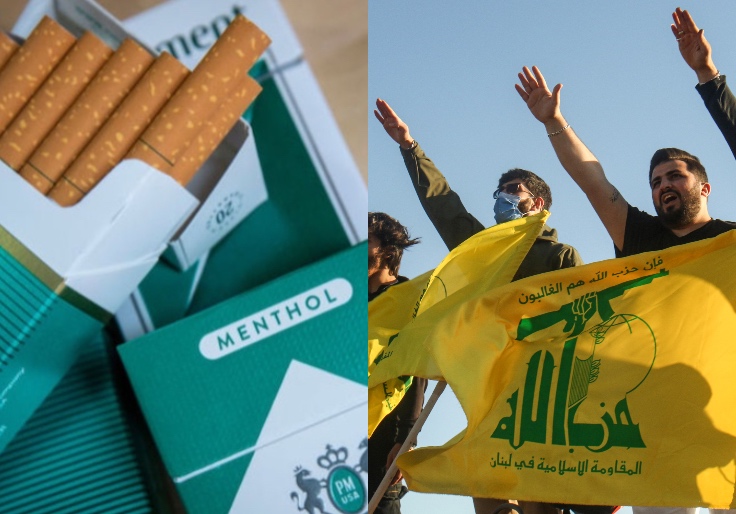The Biden administration does not have a plan in place to prevent Hezbollah from cashing in on its proposed menthol cigarette ban, which lawmakers and experts say will open up a black market that will enrich the Iran-backed terror group and Mexican drug cartels.
As the FDA considers a ban on mentholated cigarettes, a type smoked by around 40 percent of adults, lawmakers have been pressing federal authorities to develop contingency plans meant to stop Hezbollah and its Mexican cartel partners from smuggling black market cigarettes into the United States.
But Customs and Border Protection (CBP) and the Bureau of Alcohol, Tobacco, and Firearms (ATF) do not appear to have developed any plans to combat the emerging black market menthol trade, which is likely to generate millions in profit. Hezbollah, Hamas, and other terrorist groups have long trafficked in illegal cigarettes, generating revenue that funds terror operations across the globe. The regulated menthol market in the United States is worth an estimated $30 billion.
"The FDA's ban will likely enrich Hamas, Hezbollah, and other terrorist groups, and the Biden administration is ignoring the national security risks entirely, just like they've ignored the ongoing public health disasters," Rep. Jim Banks (R., Ind.), a member of the House Armed Services Committee, told the Washington Free Beacon.
Banks is one of several lawmakers in both the House and Senate who have been pressing the Biden administration to pause its menthol ban until the relevant federal agencies can prove they have a plan in place to combat black market sales. Congressional sources working on the issue said the administration has yet to respond to their inquiries or address concerns about terrorism financing. The ATF and CBP would also not address questions about whether they have been tasked with formulating contingency plans or preparing for a black market boom.
"Absent a clear plan to prevent Hezbollah and others from partnering with international crime organizations like Mexican cartels, it would instead leave Hezbollah, Hamas, and other bad actors in a prime position to profit off the black market," Banks and five of his GOP colleagues wrote in a Feb. 6 letter to the FDA. "Such an outcome would be unacceptable."
A spokesman for CBP said the agency has no information to share about the matter, while an ATF spokesman declined to comment on the proposed rule.
"Per Department of Justice policy, ATF cannot comment on a proposed rule that is still in the rulemaking process," the spokesman said, adding that, in general terms, the agency's "tobacco enforcement program coordinates with our local, state, and federal law enforcement partners to target, identify, and dismantle criminal enterprises with ties to violent crime, that traffic illicit contraband tobacco in interstate commerce."
ATF would not comment specifically on concerns about Hezbollah and other terror groups exploiting America's southern border to smuggle menthol cigarettes.
Richard Goldberg, an analyst who served on the White House National Security Council, said he had seen no indication the Biden administration has prepared federal authorities to deal with an increase in illicit cigarette smuggling, raising particular concerns as Iran-backed terror groups wreak havoc across the Middle East in the wake of Hamas's Oct. 7 attack on Israel.
"It should alarm every American that our border is wide open, Hezbollah is about to be incentivized to establish massive cigarette trafficking networks in America, and the agencies responsible for stopping it have not been tasked with any mitigation plan," said Goldberg, now an adviser to the Foundation for Defense of Democracies think tank.
Rep. Mark Green (R., Tenn.), the chairman of the House Homeland Security Committee, said there is compelling evidence to indicate that Hezbollah will take "advantage of this new black market in illicit tobacco products and [use] the profits to fund their nefarious activities."
In 1997, Green noted, the ATF busted an $8 million cigarette smuggling operation that enriched Hezbollah and its cartel partners.
Sources said the administration has not responded to Green's letter requesting more information.
Since that time, Iran has significantly stepped up its presence in Latin America, bolstering Hezbollah cells and inking diplomatic partnerships with multiple countries in the region.
"It is well-documented that Hezbollah is a leader in the illicit cigarette trade—not halfway around the world but right here in the Western Hemisphere," Reps. Andrew Garbarino (R., N.Y.) and Jared Moskowitz (D., Fla.) wrote in a November 2023 letter to the FDA. "There have been cases in which Hezbollah and Hamas cells have smuggled cigarettes into the United States to send the revenue overseas. Given Hezbollah's established cigarette business and its ties to the Mexican drug cartels, we cannot discount the potential for this FDA-proposed [menthol cigarette] rule to open a massive revenue stream for this Hamas-allied foreign terrorist organization."
In the Senate, Tom Cotton (R., Ark.) has been leading a charge to halt the Biden administration's menthol ban, which he says will "allow terrorist organizations such as Hezbollah to rake in millions from black market menthol cigarettes and use the profits to finance their terrorist activities."
